So, I taught my Friday afternoon class and came home, looking forward to the weekend. Allen busied himself with the boat, getting it ready for to take out for a couple of nights. Just him and our dog, Buddha.
I stayed home, cooked something, ate, fiddled around on the Internet, downloaded some Buffy Sainte Marie songs ("Bury My Heart at Wounded Knee," "Starwalker," "Cod'ine," "He's a Keeper of the Fire," "God Is Alive, Magic Is Afoot," "Summer Boy," "Little Wheel, Spin and Spin," "Goodnight.") A dial up connection--hello?--it took a long time.
If you're a woman looking for strength, I highly recommend "Starwalker." It'll make you want to paint your naked body and dance and dare anybody to mess with you. From Buffy's website:
This is one of my [Buffy's] favourite songs, not only because it's a gas to sing it, but also because it's about the incredible energy of our contemporary Indian people. Because of what our ancestors went through for us. I sing it for all our generations past, and all our generations yet to come.
Starwalker he’s a friend of mine
You’ve seen him looking fine he’s a
straight talker
he’s a Starwalker don't drink no wine
ay way hey o heya
Wolf Rider she’s a friend of yours
You’ve seen her opening doors
She’s a history turner
she’s a sweetgrass burner and a
dog soldier
ay hey way hey way heya
Holy light guard the night
Pray up your medicine song oh
straight dealer you’re a spirit healer
keep going on
ay hey way hey way heya
Lightning Woman Thunderchild
Star soldiers one and all oh
Sisters, Brothers all together
Aim straight Stand tall
Starwalker he’s a friend of mine
You’ve seen him looking fine he’s a
straight talker
He’s a Starwalker don't drink no wine
ay way hey o hey...
You have to hear it. The chanting is amazing.
Later, I watched a movie about Edvard Munch. Then I slept until late, fed the cats, watered cats and flowers and pepper plants and tomatoes, checked the mail. Back on the cement slab outside our back door, I heard a strange sound, an animal. It was the rooster, calling to the hens. They were separated from each other and seeking each other out.
I came inside and turned on the Internet. I found this article by Robert Pinsky on Bloglines and the article drew me in and in until I found myself needing to write about it.
Pinsky writes about myths and allusions, how they do their work even if we don't fully understand the implications behind them. He uses a poem by Louise Gluck as illustration.
It's quite something to go from Buffy Sainte Marie lifting her voice in a collective warrior's cry to Gluck's quiet and deep exploration of women's lives. The Persephone Myth is spun into new cloth as the woman first imagines she was abducted by life, then that she offered herself. Two very different paths. Shouldn't each path yield a different arrival? Gluck writes of the "horrible mantle of daughterliness clinging to her." How intriguing. We usually think of Demeter's love for her daughter, of joyful reunion in Spring, not of a burden of belonging. So what is this horrible mantle? I understand it, but with my heart and not my head; I understand with a mystical kind of knowing. The power of myth.
Gluck takes us through the cycle of marriage: Death, husband, God, Stranger. The woman looks into the water, hoping for something about herself to be revealed. What? Who am I? Daughter, wife, mother, self--which? all?
"I am never alone," the woman has thought, then turned the thought into prayer. She sought to escape her body, to merge into someone else's. She's belonged to others, never herself. She wants to be alone, yet is lonely.
Well, time to make a little supper. I miss Allen and Buddha. I miss their physical energy, their play, Allen's laughter. I feel lonely, like the woman at the pool. Later, I'll cradle a book or do some writing, grade some papers. They will be home Sunday, and I will have gotten a lot done, I hope.
---------------------------------
Poet's Choice
By Robert Pinsky
Sunday, September 17, 2006; BW12
A really good allusion works even if you can't identify it. Like myths, allusions change with each repetition. The chariot of the sun, the bitter withy, Tippecanoe and Tyler too, Pandora's box, the Manassas Mauler: They mean more after you have looked them up, but they contain enough hints of sound and image to succeed on their own. Anybody can make a good guess, for example, at which of these phrases are political, mythological or biblical.
Sometimes, the wrong guess is a revealing part of making sense: If a great prizefighter's nickname sounds a little classical or biblical, alluding to him that way becomes part of his meaning. The sound and aroma of the syllables affects the myth.
Without some skill at guessing, who could navigate through any ordinary day with its words and images? Sometimes sorting and guessing is part of the point. The myths and allusions and meanings may be several. They may be invented, merging or overlapping. Here is "A Myth of Innocence," from Louise Glück's recent book Averno :
One summer she goes into the field as usual
stopping for a bit at the pool where she often
looks at herself, to see
if she detects any changes. She sees
the same person, the horrible mantle
of daughterliness still clinging to her.
The sun seems, in the water, very close.
That's my uncle spying again, she thinks--
everything in nature is in some way her relative.
I am never alone, she thinks,
turning the thought into a prayer.
Then death appears, like the answer to a prayer.
No one understands anymore
how beautiful he was. But Persephone remembers.
Also that he embraced her, right there,
with her uncle watching. She remembers
sunlight flashing on his bare arms.
This is the last moment she remembers clearly.
Then the dark god bore her away.
She also remembers, less clearly,
the chilling insight that from this moment
she couldn't live without him again.
The girl who disappears from the pool
will never return. A woman will return,
looking for the girl she was.
She stands by the pool saying, from time to time,
I was abducted, but it sounds
wrong to her, nothing like what she felt.
Then she says, I was not abducted.
Then she says, I offered myself, I wanted
to escape my body. Even, sometimes,
I willed this. But ignorance
cannot will knowledge. Ignorance
wills something imagined, which it believes exists.
All the different nouns--
she says them in rotation.
Death, husband, god, stranger.
Everything sounds so simple, so conversational.
I must have been, she thinks, a simple girl.
She can't remember herself as that person
but she keeps thinking the pool will remember
and explain to her the meaning of her prayer
so she can understand
whether it was answered or not.
The pleasure is partly in the playful distance between writer and character. "Allude" shares its root with "ludic" and "ludicrous," the vocabulary of play. The alternate things the character says, the "different nouns" she tries, the trickiness of a word such as "simple": These illustrate the shimmery nature of meaning, which inspires the devisings of myth, as well as the pranks of allusion.
(Louise Glück's poem "A Myth of Innocence" is from her book "Averno." Farrar Straus Giroux. Copyright © 2006 by Louise Glück.)
Subscribe to:
Post Comments (Atom)
Pages
Dreaming
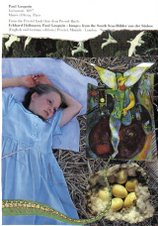
About Me

- Theresa Williams
- Northwest Ohio, United States
- "I was no better than dust, yet you cannot replace me. . . Take the soft dust in your hand--does it stir: does it sing? Has it lips and a heart? Does it open its eyes to the sun? Does it run, does it dream, does it burn with a secret, or tremble In terror of death? Or ache with tremendous decisions?. . ." --Conrad Aiken
Followers
Facebook Badge
Search This Blog
Favorite Lines
My Website
Epistle, by Archibald MacLeish
Visit my Channel at YouTube
Great Artists
www.flickr.com
This is a Flickr badge showing public photos from theresarrt7. Make your own badge here.
Fave Painting: Eden
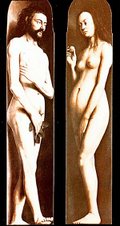
Fave Painting: The Three Ages of Man and Death

by Albrecht Dürer
From the First Chapter
The Secret of Hurricanes : That article in the Waterville Scout said it was Shake- spearean, all that fatalism that guides the Kennedys' lives. The likelihood of untimely death. Recently, another one died in his prime, John-John in an airplane. Not long before that, Bobby's boy. While playing football at high speeds on snow skis. Those Kennedys take some crazy chances. I prefer my own easy ways. Which isn't to say my life hasn't been Shake-spearean. By the time I was sixteen, my life was like the darkened stage at the end of Hamlet or Macbeth. All littered with corpses and treachery.
My Original Artwork: Triptych
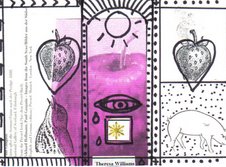
Wishing
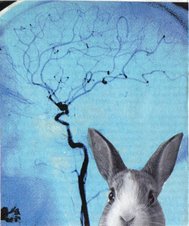
Little Deer
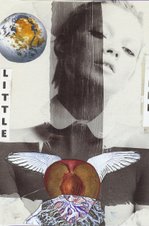
Transformation
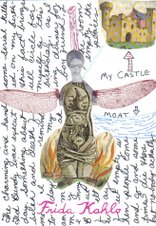
Looking Forward, Looking Back
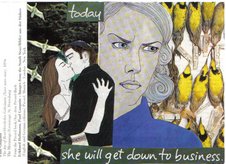
Blog Archive
-
▼
2006
(96)
-
▼
September
(20)
- Apocalyptic Thinking
- When Nations grow Old...
- The Permanent Realities of Every Thing
- Tombs
- Meant for Now
- Go Into a Wilderness
- We act just like the flower does in blooming
- Mysticism and Scholarship
- Nature is not humane; we should be like nature
- Spirit Matters
- Buffy, Pinsky, Gluck, and me
- Invocation
- Books are alive
- Expanding the reach of who you are
- "Into all abysses I still carry the blessings of m...
- Yes and No
- Didn't You Want to Be a Writer?
- The world is waiting...
- Making One of Opposites
- Sanctuary
-
▼
September
(20)
CURRENT MOON
Labels
- adolescence (1)
- Airstream (7)
- Alain de Botton (1)
- all nighters (2)
- Allen (1)
- altars (1)
- Angelus Silesius (2)
- animals (1)
- Annie Dillard (1)
- Antonio Machado (2)
- AOL Redux (1)
- April Fool (1)
- Archibald MacLeish (1)
- arts and crafts (55)
- Auden (1)
- awards (2)
- AWP (2)
- Bach (1)
- Basho (5)
- Beauty and the Beast (1)
- birthdays (1)
- blogs (5)
- boats (2)
- body (2)
- books (7)
- bookstores (1)
- Buddha (1)
- Buddha's Little Instruction Book (2)
- butterfly (4)
- buzzard (2)
- Capote (4)
- Carmel (1)
- Carson McCullers (1)
- cats (15)
- Charles Bukowski (1)
- Charles Simic (2)
- Christina Georgina Rossetti (1)
- church (2)
- confession (1)
- Conrad Aiken (1)
- cooking (5)
- crows (1)
- current events (2)
- D. H. Lawrence (3)
- death (6)
- Delmore Schwartz (4)
- detachment (1)
- dogs (7)
- domestic (3)
- dreams (21)
- Edward Munch (4)
- Edward Thomas (1)
- Eliot (3)
- Eliot's Waste Land (2)
- Emerson (2)
- Emily Dickinson (10)
- ephemera (1)
- Esalen (6)
- essay (3)
- Eugene O'Neill (3)
- Ezra Pound (1)
- F. Scott Fitzgerald (1)
- fairy tales (7)
- Fall (16)
- Famous Quotes (16)
- festivals (2)
- fire (5)
- Floreta (1)
- food (1)
- found notes etc. (1)
- found poem (2)
- fragments (86)
- Frida Kahlo (1)
- frogs-toads (4)
- Georg Trakl (1)
- gifts (1)
- Global Warming (1)
- Gluck (1)
- goats (1)
- Goodwill (1)
- Great lines of poetry (2)
- Haibun (15)
- haibun moleskine journal 2010 (2)
- Haiku (390)
- Hamlet (1)
- Hart Crane (4)
- Hayden Carruth (1)
- Henry Miller (1)
- holiday (12)
- Hyman Sobiloff (1)
- Icarus (1)
- ikkyu (5)
- Imagination (7)
- Ingmar Bergman (1)
- insect (2)
- inspiration (1)
- Issa (5)
- iTunes (1)
- Jack Kerouac (1)
- James Agee (2)
- James Dickey (5)
- James Wright (6)
- John Berryman (3)
- Joseph Campbell Meditation (2)
- journaling (1)
- Jung (1)
- Juniper Tree (1)
- Kafka (1)
- Lao Tzu (1)
- letters (1)
- light (1)
- Lorca (1)
- Lorine Niedecker (2)
- love (3)
- Lucille Clifton (1)
- Marco Polo Quarterly (1)
- Marianne Moore (1)
- Modern Poetry (14)
- moon (6)
- movies (20)
- Muriel Stuart (1)
- muse (3)
- music (8)
- Mystic (1)
- mythology (6)
- nature (3)
- New Yorker (2)
- Nietzsche (1)
- Northfork (2)
- November 12 (1)
- October (6)
- original artwork (21)
- original poem (53)
- Our Dog Buddha (6)
- Our Dog Sweet Pea (7)
- Our Yard (6)
- PAD 2009 (29)
- pad 2010 (30)
- Persephone (1)
- personal story (1)
- philosophy (1)
- Phoku (2)
- photographs (15)
- Picasso (2)
- Pilgrim at Tinker Creek (1)
- Pillow Book (5)
- Pinsky (2)
- plays (1)
- poem (11)
- poet-seeker (9)
- poet-seer (6)
- poetry (55)
- politics (1)
- poppies (2)
- presentations (1)
- Provincetown (51)
- Publications (new and forthcoming) (13)
- rain (4)
- Randall Jarrell (1)
- reading (6)
- recipes (1)
- Reciprocity (1)
- Richard Brautigan (3)
- Richard Wilbur (2)
- Rilke (5)
- river (5)
- river novel (1)
- rivers (12)
- Robert Frost (2)
- Robert Rauschenberg (1)
- Robert Sean Leonard (1)
- Robinson Jeffers (1)
- Rollo May (2)
- Rumi (1)
- Ryokan (1)
- Sexton (1)
- short stories (13)
- skeletons (2)
- sleet (1)
- snake (1)
- Snow (24)
- solitude (1)
- spider (2)
- spring (1)
- Stanley Kunitz (1)
- students (2)
- suffering (4)
- suicide (2)
- summer (20)
- Sylvia Plath (2)
- Talking Writing (1)
- Tao (3)
- teaching (32)
- television (4)
- the artist (2)
- The Bridge (3)
- The Letter Project (4)
- The Shining (1)
- Thelma and Louise (1)
- Theodore Roethke (16)
- Thomas Gospel (1)
- Thomas Hardy (1)
- toys (3)
- Transcendentalism (1)
- Trickster (2)
- Trudell (1)
- Ursula LeGuin (1)
- vacation (10)
- Vermont (6)
- Virginia Woolf (1)
- Vonnegut (2)
- Wallace Stevens (1)
- Walt Whitman (8)
- weather (7)
- website (3)
- what I'm reading (2)
- William Blake (2)
- William Butler Yeats (5)
- wind (3)
- wine (2)
- winter (24)
- wood (3)
- Writing (111)
- Zen (1)





2 comments:
Thank you for posting the Buffie song and Gluck poem. The first takes me back to an old love, the latter moves me forward through the stages of my identity as a woman.
Gretchen
Theresa:
WOW! I can't figure out how to reply to the individual posts you wrote this weekend and on Monday, but each was so thoughtful and so full that I'll be digesting them for weeks, I'm sure. Reciprocity. Mythicism. The human project. I will read these entries several more times.
Thank you.
Erin
Post a Comment